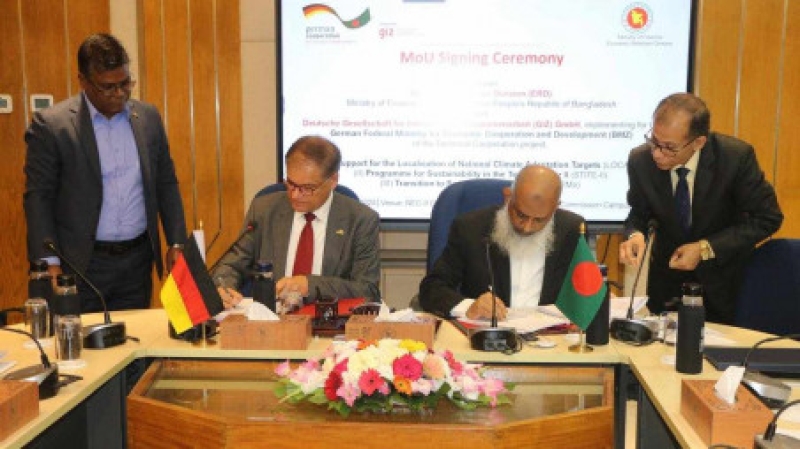- Human Rights Record ‘Alarming’ Over 17 Months, Says HRSS |
- Tarique Warns of Deep Plot, Urges Vigilance Nationwide |
- Son of late ruler Gadhafi is killed in Libya |
- Special prayers, foods, charity mark Shab-e-Barat in Old Dhaka |
- Exiled Awami League Leaders Plan Political Comeback from India |
Bangladesh, Germany Sign €14.45m in Technical Agreements

In a major step towards advancing sustainable development, Bangladesh and Germany have signed three technical cooperation agreements today, totaling €14.45 million. These agreements are designed to foster sustainability across key sectors, including textiles, climate adaptation, and e-mobility.
The agreements were signed by Md Shahriar Kader Siddiky, Secretary of the Economic Relations Division (ERD) at the Ministry of Finance, and Andreas Kuck, Country Director of GIZ in Bangladesh, in the presence of senior officials. This marks a new chapter in the bilateral cooperation between the two nations, according to a press release from the ERD.
Project Details:
1. Programme for Sustainability in the Textile Sector II (STILE-II)
Total Project Fund: €7.3 million
Sponsoring Ministry: Ministry of Commerce
This project aims to modernize Bangladesh's textile and ready-made garment (RMG) industries to meet European Union sustainability standards. Key objectives include strengthening public-private partnerships and improving gender equality in the workforce. The project will also focus on the alignment of local policies with international sustainability benchmarks, boosting the sector's competitiveness and sustainability.
2. Support for the Localization of National Climate Adaptation Targets (LOCAT)
Total Project Fund: €3 million
Sponsoring Ministry: Local Government, Rural Development (LGRD)
LOCAT is focused on building the capacity of local governments to implement city climate action plans in alignment with Bangladesh's National Adaptation Plan. The project will develop tools for gender-responsive climate action in urban settings and establish a multi-level framework for learning and sharing climate action strategies at the local level.
3. Transition to Sustainable E-Mobility (Trans2SMo)
Total Project Fund: €4.15 million
Sponsoring Entity: Power Division
This initiative aims to promote the adoption of sustainable electric mobility in Bangladesh through collaboration among policymakers, businesses, and academic institutions. Key activities include strengthening legal and regulatory frameworks for electric vehicles, building capacity across various sectors, and demonstrating the feasibility of electric vehicles through pilot projects in selected cities.
The signing of these agreements represents a significant milestone in the growing partnership between Bangladesh and Germany. Both countries have reaffirmed their shared commitment to advancing sustainable development through concrete initiatives aimed at fostering economic growth, environmental sustainability, and gender equality in critical sectors.
These agreements are expected to play a pivotal role in helping Bangladesh achieve its long-term goals of sustainable development, while also addressing the pressing challenges of climate change, social equity, and technological innovation.

